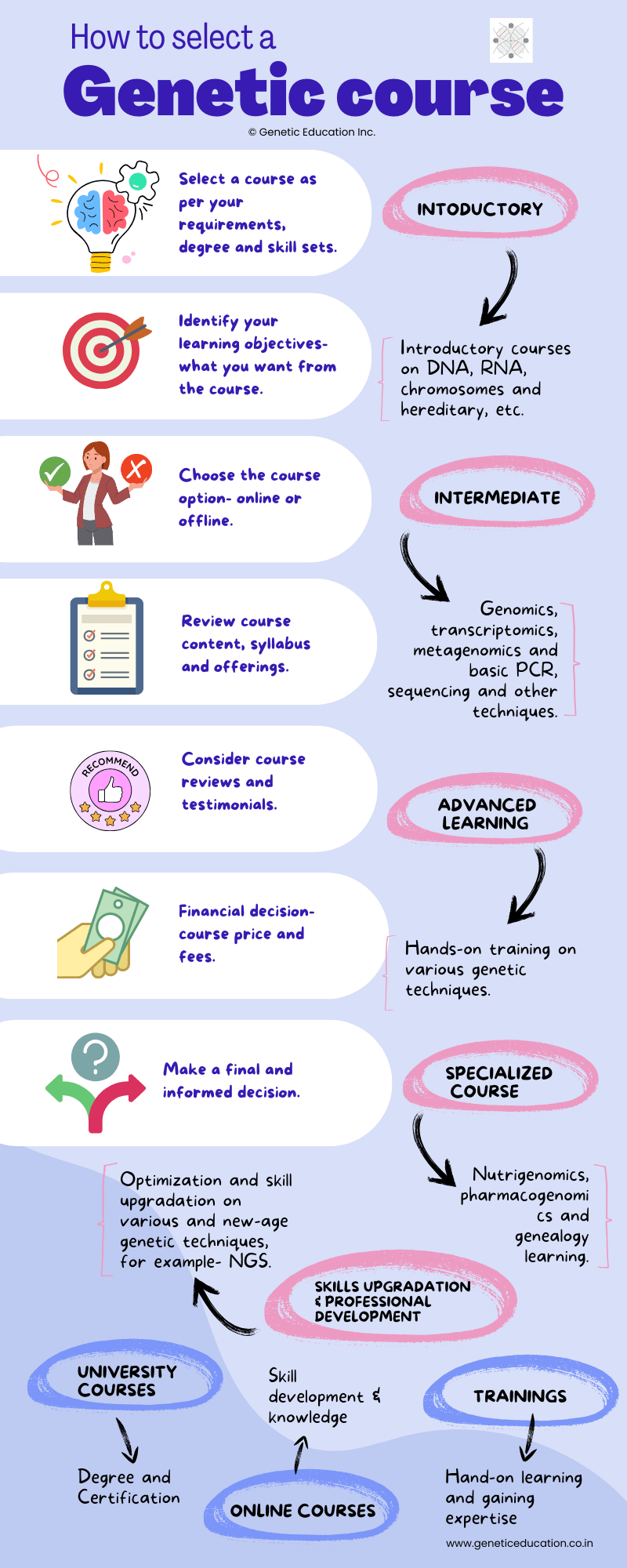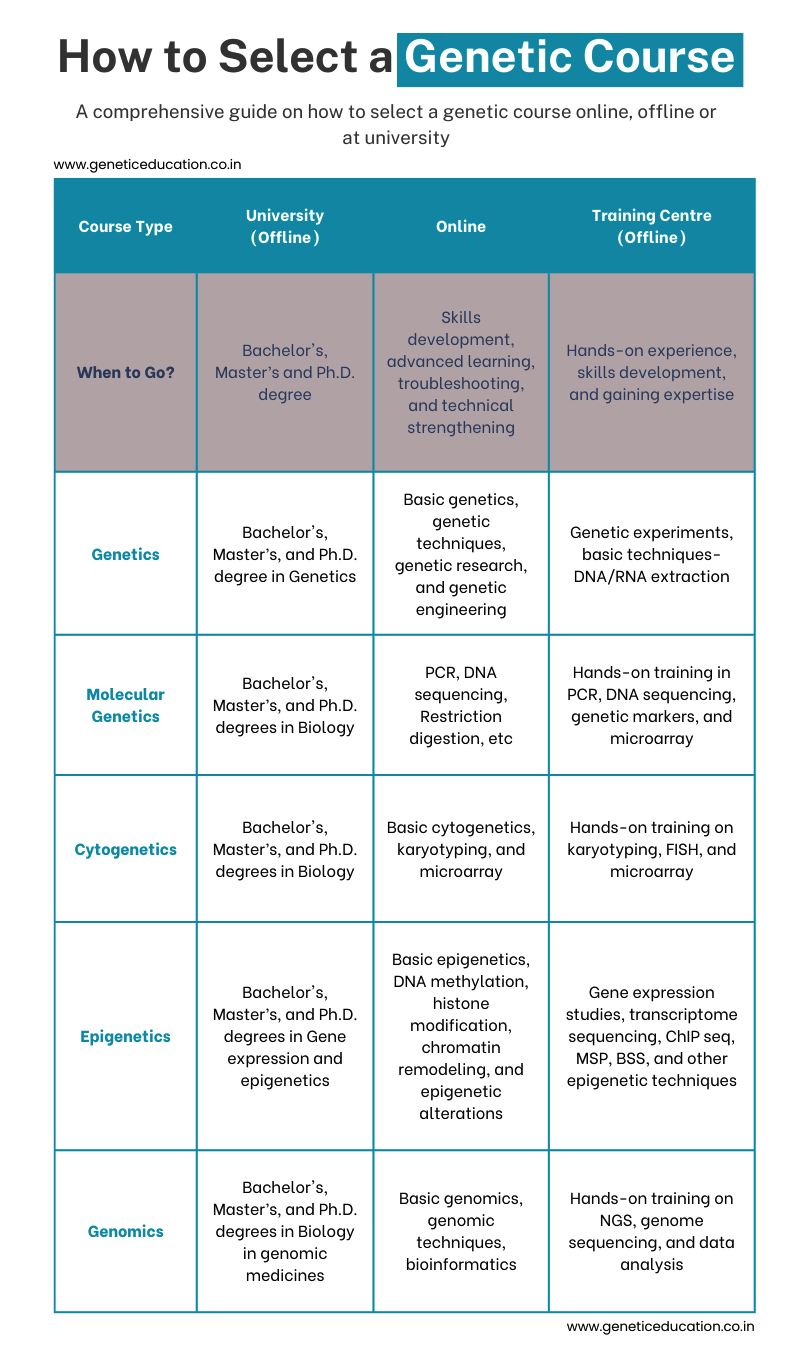“The present guide will help you pick the right genetic course, online, offline, or at university.”
Want to grow your career in the field of genetics, scale up your existing knowledge or gain advanced knowledge? This article is for you.
In this rapidly growing online world, learning is accessible easily. However, choosing the right learning module or platform is quite difficult as the internet is flooded with fraud and generic content.
One wrong selection ends up wasting money and time. Moreover, the decision becomes more crucial for specialized and sophisticated fields like “genetics.” Having less content availability, expertise and learning options, choosing the right genetic course is a critical decision.
Look no further!
In this article, I will guide you to choose the right genetic course as per your interests, requirements and future prospects. Trust me, after reading this article, it will be easy for you to navigate your genetic learning to the next level.
Stay tuned.
Related articles:
- Top 10 Essential Resources for Genetics Research Students.
- 10 Hot Topics in Genetic Research/Studies for 2024.
Key Topics:
What are genetic courses?

Now! First and foremost it is empirical to understand what is considered in genetic courses. You may be a beginner, a college student, a researcher or someone who is curious about learning genetics. So you have to first know what topics are included in genetics.
Genetics is the study of genes, chromosomes, DNA and RNA. Common interdisciplinary fields are genetics, genomics, epigenetics, transcriptomics and metagenomics. Common techniques used in these fields are restriction digestion, PCR, sequencing, microarray and karyotyping.
Besides, many more sub-topics and newly emerged fields as well as techniques and technical optimizations are available. So how can you know which one is for you? Check out the table first.
| Field | Topics | Techniques |
| Genetics | DNA, RNA, genes, chromosomes and hereditary | Restriction digestion, PCR, DNA sequencing, electrophoresis and hybridization. |
| Genomics | Genome and chromosomes | Genome sequencing, NGS, pyrosequencing and microarray. |
| Transcriptomics | mRNA, gene expression, transcription and gene regulation | Transcriptome sequencing, exome sequencing and NGS |
| Epigenetics | DNA modifications, gene expression, DNA methylation and epigenetic alterations | ChIP-seq, MSP, methylation sequencing, etc. |
| Cytogenetics | Chromosomes, deletion, duplication, translocation and karyotyping. | Karyotyping, FISH, and chromosomal microarray. |
| Cancer genetics | Oncogenes and protooncogenes. | RT-PCR, DNA sequencing and microarray. |
| Specialized fields | Pharmacogenomics, nutrigenomics, metagenomics and genealogy | DNA sequencing. |
So the first thing you have to understand is the main keyword. The course should have the main keyword or topic, covered in the above list. Now, let’s move into the process of how to select the most suitable genetic course for you.
Step 1: Your match
First, you need to know who you are and accordingly, which course is best for you. The Internet and universities have different course modules ranging from beginners– lack sheer genetic knowledge to those who seek advanced skills and specializations.
Your current knowledge, level of education, skill sets and learning objectives assessment can help you choose your best-suited course. Here is a table that will help you with this.
| Target audience | Group | Course modules |
| Introductory course for beginners | High school students and undergraduates. | Introductory courses on DNA, RNA, chromosomes and hereditary, etc. |
| Intermediate level learners | Graduates and postgraduates | Genomics, transcriptomics, metagenomics and basic PCR, sequencing and other techniques. |
| Advanced courses for professionals | Doctorates, researchers and scientists | Hands-on training on various genetic techniques. |
| Skills upgradation and professional development | Doctorates, researchers and scientists | Optimization and skill upgradation on various and new-age genetic techniques, for example- NGS. |
| Specialized course | For any graduate | Nutrigenomics, pharmacogenomics and genealogy learning. |
Sounds good! Let’s move ahead.
Step 2: Identify your learning goals
Now in the second step, you have to identify your learning goals. Ask these questions to yourself to know your learning goal.
- Are you curious about learning genetics?
- Are you an undergraduate or high school student?
- Do you want to conduct your research or want to back up your doctorate research?
- Do you want to learn new skills or upgrade your existing skill sets?
- Are you looking for professional career development in the field of clinical?
- Are you looking to become a scientist?
- Do you want to become a tutor or educator?
Understanding your current educational level, skill sets, proficiency, and future endeavors will help you choose the best course for yourself. The table given in Step 1 will help you answer these questions.
Choose one answer and you are ready to go!
Step 3: Choose the course option
Now, you know which type of course you are looking for and what your learning goals are. In the next step, you will have to choose the course option. University programs, hands-on training, seminars, symposiums, online courses, webinars and hybrid models are several options available for genetic courses.
You need to choose your course options. Here I’m comprehensively listing the benefits and limitations of each option.
University Programs:
Mode: Offline and online
| Advantages | Limitations |
| Affiliation and certification | Long durations (usually 2 to 5 years). |
| Learning from peers, scientists and professors. | Costly. |
| Available as graduation, post-graduation and Ph.D degree courses. | Lack of advanced training facilities. |
| Extensive theoretical and practical knowledge. | Mandatory physical presence. |
| Hands-on training is available (offline) |
Noteworthy, the online courses conducted by universities and colleges lack depth. So it’s a good idea to enroll in offline courses.
Online platforms:
Mode: online only
| Advantages | Limitations |
| Available as per the requirements. | Lacks expertise. |
| Cost-effective. | Can not provide affiliation and degree. |
| Learning is available at your own pace. | Prone to fraud. |
| Easily accessible from any location. | Lacks hands-on training and lab experience. |
| Available with interactive learning elements such as multimedia files and texts. |
Training center:
Mode: Offline
Specialized training institutes, organizations and genetic laboratories also offer various online and offline courses in the form of webinars, live classes, onsite workshops, training and virtual labs.
These courses help you learn new techniques or update your existing ones. This will help you in your job and career development.
In summary, the options available with online and offline genetic courses are listed here.
| Aspect | Offline | Online |
| University/College | ✔️ Affiliation | ✔️ Affiliation |
| Degree | ✔️ Bachelor’s, Master’s, Ph.D. | ❌ Certificate |
| Certificate | ✔️ Yes | ✔️ Yes |
| Hands-on Training | ✔️ Provided | ❌ Limited |
| Real Lab Experience | ✔️ Available | ❌ Limited |
| Duration | Long | Short |
| Expertise | High | Low |
| Fees | High | Low |
| Flexibility | ❌ Limited | ✔️ Flexible |
| Interactive Learning | ❌ Limited | ✔️ Available |
| Practical Application | ✔️ Practical Application | ✔️ Theoretical Learning |
| Group Collaboration | ✔️ Group Collaboration | ❌ Limited |
| Support Services | ✔️ Additional Support | ✔️ Virtual Support |
| Time Commitment | ✔️ Fixed Schedule | ✔️ Self-Paced Learning |
| Assessment Methods | ✔️ Traditional Methods | ✔️ Online Assessments |
Choose your mode of learning! Moving ahead.
Step 4: Course content, syllabus and offerings
In the previous step, you chose your course delivery mode. Now, it’s time to dive deep into the genetic course content, syllabus and offerings. No matter which type of target audience you are! The course conductor should have to deliver what they offer!
Closely examine the content or syllabus of the genetic course. For instance, a basic genetic course should contain all the essential information regarding DNA, genes, chromosomes, genome and genetics.
Likewise, a PCR course should contain all the theoretical as well as technical aspects of PCR along with demonstrations like primer design, multiple PCR setup and in silico PCR, etc.
In addition, offerings such as worksheets, videos and live sessions, if included, should be delivered. In conclusion, you should have to understand the syllabus and course offerings.
Step 5: Consider the instructor’s expertise
ChatGPT and other AI can prepare courses and modules in a single click, nowadays. That’s not a tedious job! So it’s crucial to know if the instructor’s expertise, experience and education are sufficient to teach you or deliver the course.
Check out this table to know more.
| Expertise, education and experience | Modules they can teach |
| Any life science graduate | Basic genetics- DNA, RNA, chromosome, gene or genome. |
| B.Sc or M.Sc in Genetics with a few years of teaching experience | Advanced genetics, genomics, transcriptomics, epigenetics metagenomics (theory). |
| Master’s or Ph.D. in genetics and a few years of hands-on working experience | Basic genetics and genomics techniques- PCR, RT-PCR, DNA sequencing, Restriction digestion, Genetic markers, etc. |
| Expertise in specialized fields | Advanced PCR learning and troubleshooting, NGS and advanced sequencing platforms, data analysis, etc. |
| PhD or doctorate in Genetics (specialization) | Metagenomics, transcriptomics, nutrigenomics, pharmacogenomics. |
Based on the syllabus and offerings in the course, the educator should have adequate and equivalent education, expertise and experience.
For instance, Dr Tushar Chauhan (myself) has prepared the advanced PCR mastery course at Genetic Education Inc. Those who know me are aware of my expertise and work experience. You can also take a look at my profile here.
Step 6: Reviews and testimonials
Just before enrolling in the course, you should consider reviews and testimonials. Students’ reviews and testimonials are the real proof of how the course helps them to learn the topic or subject.
If the course is too expensive and offers many modules you can contact previous trainees on social media and ask them about the course content, quality and deliverability.
Reviews and testimonials should be the best sources that give you confidence to enroll in the course.
Step 7: Financial decision
Once you go through all of these steps, now! You may have to make a decision, whether you are going with the genetic course or not. But you are confused about the fees. Whenever a university offers any course, you have to pay fees as per the rules and regulations of the University. But still, you can compare other available courses at other Universities, compare their fees and various other expenses.
Conversely, for an online course, the price must justify the content of the course. For instance, we have two different courses- one basic PCR master course (at 999/- INR) and another advanced PCR mastery course (at 2499/- INR).
These two course prices are way lower than other courses available on other platforms. In addition, the trainee will learn these skills from industry experts. In conclusion, for online courses, you can compare prices from various platforms and make a decision.
However, keep in mind that a tutor’s expertise, experience and educational qualifications are important considerations, not only the price.
Step 8: Final decision
After considering all of these steps, it’s time to go with the course. If the course is free or of cheap price, you, definitely, give it a try. But if it’s expensive, you can review the course details, by following these steps and make your final decision.
Once again, review these points before your final decision,
- Finding the course.
- Identifying the learning goals.
- Choosing the course options.
- Reviewing course content and offerings.
- Considering reviews and testimonials.
- Financial consideration.
Conclusion

Online courses are cost-effective, handy, and easy options for learning genetics. However, to gain hands-on knowledge you have to invest a bit more and should enroll in on-site course modules.
Offline courses at a college or University should be only considered when you are looking for a legit degree. As they lack state-of-the-art instrumentation and research background, students should have to purchase other courses to learn industrial skills and advanced techniques.
I hope this article added value to your genetic course buying decision-making. Do subscribe to our blog and share this article.
Subscribe to our weekly newsletter for the latest blogs, articles and updates, and never miss the latest product or an exclusive offer.


